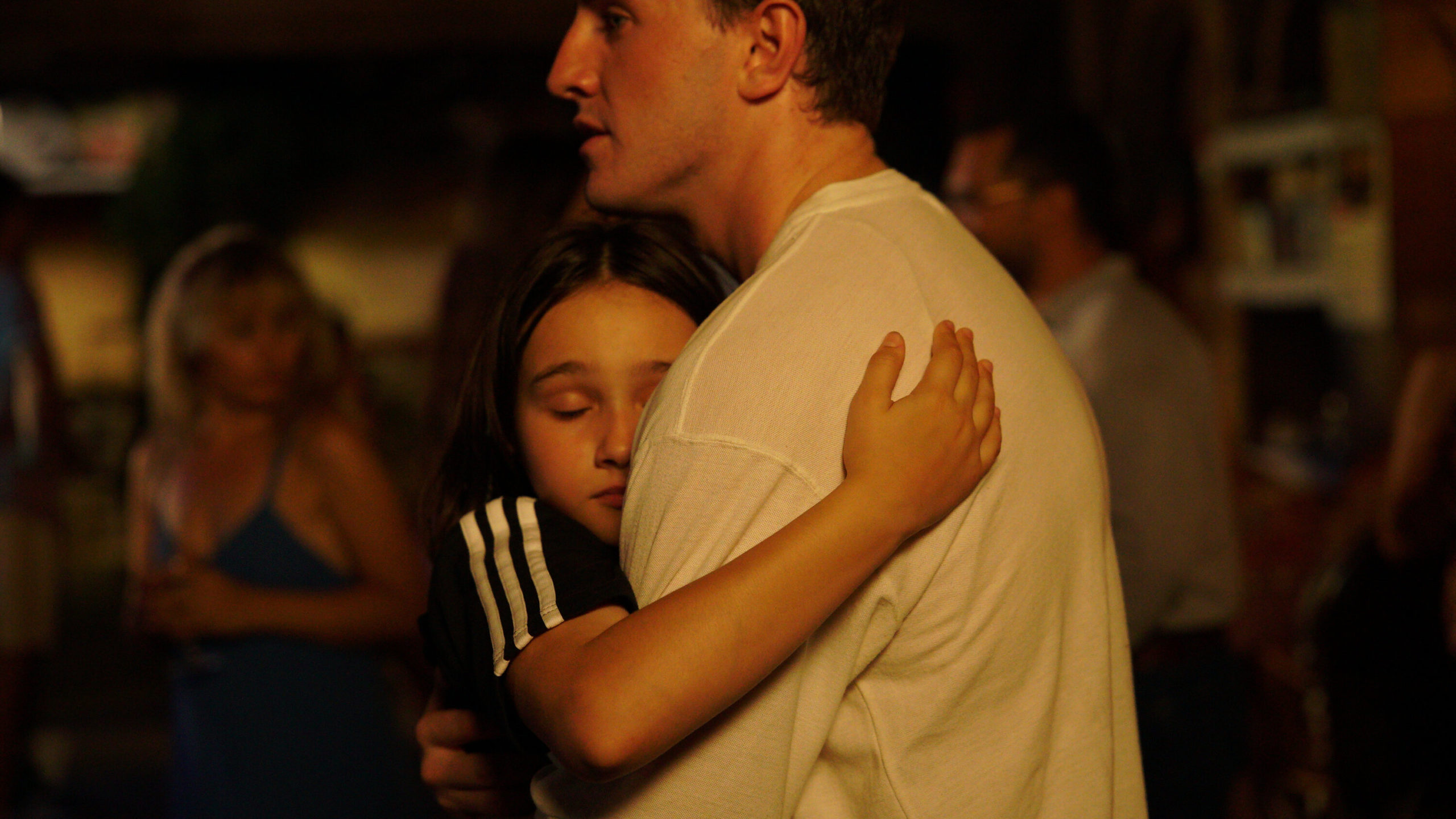A friend recently mentioned that she had “grown up poor” but had never been aware of this fact until adulthood—her parents had somehow protectively shielded their economic status from the children throughout the whole of their upbringing. Yet as adolescents, how well can we ever really know our parents or their personal circumstances? What is directly in front of us may be very difficult to see and impossible to comprehend. After all, they are just our parents, right? They couldn’t possibly have their own hopes, fears, anxieties and lives.
Part of that sentiment is at the crux of Charlotte Wells’ Aftersun, an assured and partially autobiographical first film about young father and his eleven-year-old daughter on a seemingly inconsequential seaside vacation together, one that will become a formative chapter—but only in adult retrospect—for the young girl, on the cusp of coming-of-age. It is a delicate, deliberate and often quiet film prizing observational moments over dramatic urgency. For its first half, one of seeming anecdotal meandering, we may wonder if a “plot” will be revealed; but it gradually becomes clear that its universality is in its perspective and theme, that of deconstructing our own childhoods illusions about our protectors. It also charts the moments when we begin to separate from our parents into our own beings, which as teens feels like liberation but in remembrance is bittersweet.
Wells’ picture opens circa 1990s where we meet young Sophie (Frankie Corio) and her father Calum (Paul Mescal), and in the opening moment Wells defines a central storytelling motif—a video camera and its footage, to later become memory and one to be viewed over and over—and an innocent question from daughter to father: “When you were eleven, what did you think you’d be doing by now?”
Wells gives us no traditional backstory or reason why the pair are on holiday together, though their stay at a Turkish seaside hotel seems one of intentional father-daughter bonding time—the only piece of information we have is that Sophie’s parents are no longer together. In one lovely moment, Sophie overhears her father speaking to her mother on the telephone, a conversation closing with “I love you.” In curiosity, she questions the sentiment.
The picture’s opening sections are a serious of small, simple moments as father and daughter navigate sleeping arrangements (the room is one bed short), go on a scuba trip together, have dinner to strains of an off-key performance of Macarena, shoot pool, lounge around the hotel pool and its environs. It is here that Sophie begins to observe the habits of slightly older teens, to which she’ll eventually gravitate.
All of this is quite low key, yet there’s something meticulously calibrated happening, rising beneath the quiet banality of the holiday routine, and something that may become clear to us before it does to Sophie—that Calum has his own issues, a perhaps emotional volatility or depression that goes unnoticed, only evidenced in particular moments as when he abruptly spits toothpaste at a bathroom mirror, stands on a balcony imagining he can fly (off?) as do the parasailers that fill the distant sky behind him, or later, cries nakedly on his bedside before wandering alone into the sea.
Wells trusts her audience to both engage with the film’s subtlety and eventually put these pieces together. We know there is something slightly askew with Calum—he has a broken wrist, in a cast, when the picture begins, which he carelessly gets wet in the pool before crudely cutting it from his arm, and he frequently apologies for perhaps not providing his daughter with the best vacation (i.e., a way of apologizing for not being the best father).
While nearly all of the film takes place during this holiday, Wells does flash forward a couple decades to give us glimpse of Sophie’s adult life, one lived with a female partner and her own child, but haunted by the benefit of hindsight. In life, Wells’ father died when she was sixteen, and in Aftersun, the filmmaker suggests a heartbreaking separation told in a well-rendered sequence of repetition as father and adult daughter circle each other on a dance floor amidst pulsing music and strobe lights, Sophie unable to fully grasp—or save—the father she presumably has spent her adult life trying to understand.
There are telling, pungent moments, as when young Sophie admonishes her father, who overpromises things, to stop claiming he will provide things that he knows he can’t afford. Later, when Sophie develops a flirtation with a vacationing boy and asserts herself by stepping onstage for a downbeat karaoke rendition of R.E.M.’s Losing My Religion before distancing from her father by spending free time with the resorts’ restless teens, the movie suggests the fundamental transition from childhood to young adulthood. Calum understands this separation, and Mescal’s performance in such alone moments is one of exquisite minimalism. In a handful of small reactions, including to Sophie’s karaoke performance and another during an impromptu birthday wish, his stillness invites our curiosity and compassion.
Across the film, Mescal (The Lost Daughter) effectively suggests a man experiencing an undefined emotional imbalance, and one who always feels slightly off center, however well-intentioned and with great effort to appear “normal.” His Calum is, by turns, upbeat, withdrawn, engaged and disengaged, loving and sometimes impatient. Wells hasn’t written such into the drama; rather, this is in Mescal’s performance. He suggests a man searching in vain for equilibrium and perhaps identity as Calum practices Tai Chi (and carries an instructional book on the trip) while ruminating about never being able to go back to his hometown, which he fled years prior. It is ultimately left to us to assemble his fractures, and the film’s heartbreaking final shot suggests such mysteries may forever be just out of reach.
3 stars



